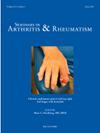低疾病活动度或缓解的类风湿关节炎患者肿瘤坏死因子抑制剂的停药与继续维持治疗:一项随机双盲安慰剂对照试验
IF 4.4
2区 医学
Q1 RHEUMATOLOGY
引用次数: 0
摘要
目的:接受肿瘤坏死因子抑制剂(TNFi)治疗的持续缓解/低疾病活动性的类风湿性关节炎(RA)患者可能是治疗降级的候选者。我们比较了这些患者在TNFi停药后和TNFi继续治疗后RA复发和发作的频率。我们也调查了复发的预测因素。方法:这项随机、双盲、安慰剂对照的非效性试验招募了接受阿达木单抗、依那西普或英夫利昔单抗治疗的成人RA患者,并且患者的疾病活动评分28- c反应蛋白(DAS-CRP)≥2.6至少6个月。患者被随机分配为2:1,要么接受安慰剂注射/输注(即停药),要么接受主动TNFi治疗。患者、研究者和研究人员被蒙面接受治疗分配。主要终点是超过48周的复发,定义为DAS29-CRP≥2.6或治疗升级。次要终点包括耀斑,定义为DAS28-CRP较基线升高≥1.2。结果:基于拒绝非劣效性的中期分析,该研究被提前终止。在研究中断时,102名患者(69名安慰剂;33名活跃的TNFi)被随机分组。安慰剂组的复发发生率为59.4%,活性TNFi组的复发发生率为18.1%(风险比为4.88;95%可信区间为2.05,11.61)。在这两组中,分别有43.5%和15.1%的人出现了耀斑。48周后,55%停用阿达木单抗的患者和26%停用依那西普的患者成功停药。结论停止维持TNFi治疗会导致RA复发率高于继续维持TNFi治疗。临床试验注册网站clinicaltrials .gov NCT01793519本文章由计算机程序翻译,如有差异,请以英文原文为准。
Discontinuation versus continuation of maintenance treatment with tumor necrosis factor inhibitors in patients with rheumatoid arthritis with low disease activity or remission: A randomized double-blind placebo-controlled trial
Objective
Patients with rheumatoid arthritis (RA) in sustained remission/low disease activity with tumor necrosis factor inhibitor (TNFi) treatment may be candidates for treatment de-escalation. We compared the frequency of relapses and flares of RA after TNFi discontinuation with TNFi continuation among such patients. We also investigated predictors of relapse.
Methods
This randomized, double-blind, placebo controlled noninferiority trial enrolled adults with RA who were treated with either adalimumab, etanercept, or infliximab, and who had a Disease Activity Score 28-C-reactive protein (DAS-CRP) < 2.6 for at least six months. Patients were randomly assigned 2:1 to either placebo injections/infusions (i.e. discontinuation) or active TNFi. Patients, investigators, and study staff were masked to treatment assignment. The primary endpoint was relapse over 48 weeks, defined as either DAS29-CRP ≥ 2.6 or treatment escalation. Secondary endpoints included flare, defined as an increase in DAS28-CRP ≥ 1.2 from baseline.
Results
The study was stopped early based on an interim analysis that rejected noninferiority. At study interruption, 102 patients (69 placebo; 33 active TNFi) were randomized. Relapses occurred in 59.4 % of the placebo group and 18.1 % of the active TNFi group (hazard ratio 4.88; 95 % confidence interval 2.05, 11.61). Flares occurred in 43.5 % and 15.1 % of these groups, respectively. Over 48 weeks, successful discontinuation was achieved in 55 % of patients who discontinued adalimumab and 26 % of patients who discontinued etanercept.
Conclusion
Discontinuation of maintenance TNFi resulted in higher rates of relapse of RA than continuation.
Trial Registration
Clinicaltrials.gov NCT01793519
求助全文
通过发布文献求助,成功后即可免费获取论文全文。
去求助
来源期刊
CiteScore
9.20
自引率
4.00%
发文量
176
审稿时长
46 days
期刊介绍:
Seminars in Arthritis and Rheumatism provides access to the highest-quality clinical, therapeutic and translational research about arthritis, rheumatology and musculoskeletal disorders that affect the joints and connective tissue. Each bimonthly issue includes articles giving you the latest diagnostic criteria, consensus statements, systematic reviews and meta-analyses as well as clinical and translational research studies. Read this journal for the latest groundbreaking research and to gain insights from scientists and clinicians on the management and treatment of musculoskeletal and autoimmune rheumatologic diseases. The journal is of interest to rheumatologists, orthopedic surgeons, internal medicine physicians, immunologists and specialists in bone and mineral metabolism.

 求助内容:
求助内容: 应助结果提醒方式:
应助结果提醒方式:


